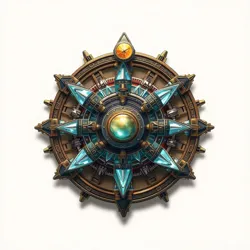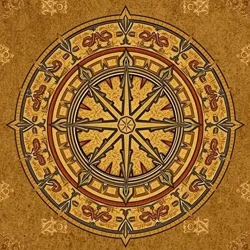Cretan Engineering Guilds
The Cretan Engineering Guilds were advanced technological organizations that flourished during the height of Minoan civilization (2700-1450 BCE). These secretive societies were responsible for developing some of the most sophisticated mechanical engineering techniques of the Bronze Age, including the famous Minoan Battle Mecha and the revolutionary Labyrinthine Core Systems.
 Reconstructed illustration of a Guild workshop beneath the palace of Knossos
Reconstructed illustration of a Guild workshop beneath the palace of KnossosOrganization and Structure
The Guilds were organized into specialized divisions, each mastering different aspects of mechanical engineering:
-
The Crystal Harmonics Masters, who developed power sources
-
The Bronze Shapers, specialists in advanced metallurgy
-
The Hydraulic Architects, experts in fluid-based movement systems
Technical Achievements
The Guilds' most significant innovation was the development of Sacred Geometry Mechanics, a system that combined mathematical principles with crystalline energy matrices. This technology formed the basis for many of their most impressive creations, including the Thalassocratic Defenders.
 Recovered fragments of a Guild-manufactured crystal power matrix
Recovered fragments of a Guild-manufactured crystal power matrixTraining and Initiation
Guild members underwent rigorous training in the Underground Learning Chambers, vast complexes beneath major Minoan palaces. Apprentices spent years mastering both technical skills and religious rituals, as the Guilds viewed engineering as a sacred art connected to the Bull Cult.
Notable Works
Besides their famous mechanical warriors, the Guilds created numerous architectural and mechanical marvels:
-
The Automated Harbor Gates of Knossos
-
The Seismic Warning Network
-
The Volcanic Steam Engines
 Sacred engineering symbols used by Guild members to mark their creations
Sacred engineering symbols used by Guild members to mark their creationsDecline and Legacy
The sudden disappearance of the Guilds coincided with the collapse of Minoan civilization around 1450 BCE. Much of their knowledge was lost, though some scholars believe certain secrets were preserved by the Aegean Artificer Brotherhood, a successor organization that emerged centuries later.
See Also
- Bronze Age Mechanical Engineering
- Ancient Crystal Technology
- Sacred Engineering Practices
References
- Chronicles of Ancient Engineering
- Minoan Technical Archives
- Bronze Age Engineering Guilds